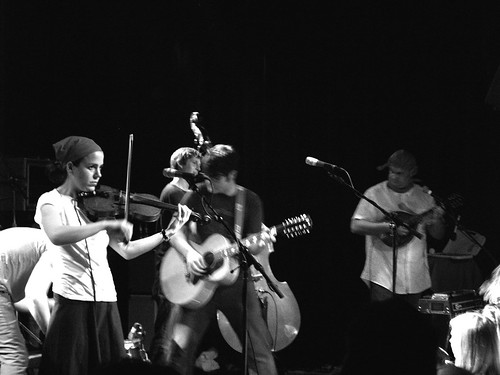Well, I don't know about that ...

The full article
From the City Pages article on The Decemberists:
"The Decemberists turn works of short historical fiction into pop songs; they have no interest in blabbing about their feelings toward their friends or their last relationship breakup. Although they are from Portland, they decline to emote."
From "Angel, Won't You Call Me?" 5 Songs, 2001:
"So here I am in corduroy
Catch it in your Polaroid
Thought it was an off night,
caught in such a warm light
But, Angel, won't you call me?
Could I be the only
though I am a lost cause
Angel, won't you call me?"
From "Grace Cathedral Hill," Castaways and Cutouts, 2002:
"Sweet on a green-eyed girl
All fiery Irish clip and curl
All brine and piss and vinegar
I paid twenty-five cents to light
A little white candle
And the world may be long for you
But'll never belong to you
But on a motorbike
When all the city lights
Blind your eyes tonight
Are you feeling better now?"
From "Red Right Ankle," Her Majesty, 2003
"This is the story of the boys who loved you
Who love you now and loved you then
And some were sweet and some were cold and snuffed you
And some just layed around in bed
And some, they crumbled you straight to your knees
Did it cruel, did it tenderly
Some they crawled their way into your heart
To rend your ventricles apart
This is the story of the boys who loved you
This is the story of your red right ankle"
From "The Engine Driver," Picaresque, 2005
"And I am a writer, writer of fictions
I am the heart that you call home
And I've written pages upon pages
Trying to rid you from my bones"
Now, I haven't gotten into the new Decemberists album enough to be able to find a quote to match up for that one, but it seems to me that their unique quality has long been an ability to deal with emotions in such deft and delicate ways, even when it comes to something as picayune as a break-up. To say that their music doesn't emote because it's literary is to deny the emotive power of literature, I think. Castaways and Cutouts remains my favorite album of theirs because to me it maintains the balance between Meloy's impressive vocabulary and contemporary narrative the best. "Grace Cathedral Hill" is most definitely about the present day; "We were both a little hungry, so we went to get a hot dog." For my money, the tail end of the last verse of "Clementine" is one of the most sweetly evocative lines I've ever heard: "And I watch as you sleep / so indelibly deep / And I hum to you 'Sweet Clementine.'"
Perhaps his early wordplay is overly precious, but as a fellow lover of words, I take great joy in his occasional overreach for rhymes like: "Medicating in the sun / pinch doses of laudanum" from "The Legionnaire's Lament." It's saying that words matter, that songwriting can be literate and evocative, that we can take comfort in the human construction of our world through language.
I see Meloy's lyrics as having anything but an "ironic, literary tone that sterilizes actual human experience to create a stylized, museum-quality version of the real thing." I feel like as the band has become increasingly comfortable within themselves, they've lost a little of the precarious balance that marked their first two (maybe three) releases. As Meloy's found the wheelhouse of his lyrical conceit, he's upped the quirkiness and played down the personal, and in response, the band has grown ever more ambitious texturally. The Crane Wife is certainly an accomplishment, and I recognize that my attachment to their first albums is emotional, and not the cold logic that is oh so ironically demanded of critics these days.
Chris Dahlen had an interesting column on Pitchfork today about the death of criticism, which is one of this blog's favorite topics. In a lot of ways he's right that the community approach to music criticism generated by blogs and other websites has taken away the upper hand that music critics have held onto for so long, so I heartily agree with him that we'll never run out of the need for simply good writing that's about more than just the buzz, the hype or how good or bad something is. Critics need to write critically, about the ideas behind music, about the people behind the ideas and about their own primary responses to the music--and not simply to say whether something's good or bad, but to illuminate the processes behind aesthetic judgements. I hope that's what I do, at least most of the time, and I hope that's what people are taking away from what I write.












2 comments:
I just meant that Meloy doesn't sing about his personal emotional response to events in his own life.(The one exception being "The Apology Song," an act of contrition that resulted from Meloy's lax custodianship of a friend's bike.)--Sarah Askari
I guess I just feel that it's sometimes hard to separate the protagonist of a song from the person who wrote it. I remember being constantly reminded by teachers not to conflate the narrator and the author, but it seems like (aside from his upfront admission that 'The Apology Song' is a true story) there's no reason to think that the events of, say, 'Grace Cathedral Hill' weren't inspired by his own life.
I think there are plenty of bands (Spoon, Crystal Skulls) that are largely unemotional in that their songs have a certain detachment and aren't intended to tug at your heartstrings, but it seems like Meloy is very distinctly aiming for the heart. Even if his songs aren't autobiographical, I don't think that means he's not responding [as an author] to events in his own life, know what I mean?
Post a Comment